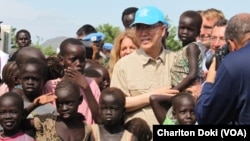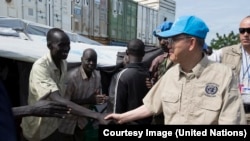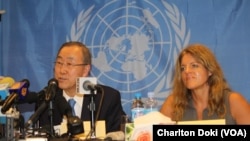JUBA —
United Nations Secretary General Ban Ki-moon pledged during a visit to Juba Tuesday to stand by the hundreds of thousands of South Sudanese displaced by nearly five months of fighting, and pressed President Salva Kiir and his rival in the conflict, former vice president Riek Machar, to rapidly find a way out of the deadly crisis.
"Today, I am standing here with some sad and heavy heavy heart," Ban told reporters after visiting a U.N. base in Juba where thousands of people are sheltering -- some since fighting first erupted in mid-December.
"The United Nations will continue to help them so that they can return to their homes as soon as possible," Ban said.
But, he stressed, before the displaced are able to return home, "There should be peace and security."
“Fighting must end. Much damage has already been done," he said, urging Kiir and Machar to "close the wounds they have opened."
"They must support justice and accountability for the crimes committed and they must act to address the root causes of the conflict," Ban said. The warring sides took a tentative step toward restoring peace Monday when they pledged to observe a one-month truce, starting Wednesday, and to recommit to a cessation of hostilities agreement signed in January but which both sides have violated repeatedly since then.
During a visit by U.S. Secretary of State John Kerry to Juba on Friday, Kiir took another small step toward ending the fighting when he agreed to a proposal to hold face-to-face talks with his arch-rival in the conflict, former vice president Machar.
Kiir said he assured Ban that he remains "ready now to travel to Addis Ababa to go and meet Riek Machar if he will accept to meet me."
If the meeting goes ahead, "We are going to talk about how to stop fighting so that people go back home," Kiir said. The president stressed the need to end the fighting rapidly, warning that famine could strike South Sudan if the unrest is allowed to drag on.
"This is the month of May ... This is the time that the rains come in our country, and everyone runs to his or her field to sow something so that, when the harvest time comes, you have something to harvest," Mr. Kiir said.
"It would be a very serious disaster if we do not allow our people to cultivate now and famine will be there. We don't want this thing to happen again as it happened in the '80s. We want to stop fighting as soon as possible," Kiir said.
Ban said he spoke by phone with Machar, who has been in hiding since unrest erupted in Juba in mid-December. He was assured by the opposition leader that he would meet with Kiir.
"He said that he has been invited by the prime minister of Ethiopia, Haliemariam Desalegn, in his capacity as chair of IGAD, to come to Addis Ababa," Ban said. "He responded positively that he will be in Addis Ababa for the meeting... He said he will try his best because he is now in a very remote area."
During his visit, Ban also met with civil society leaders and toured a U.N. compound in Juba, where thousands of displaced persons are sheltering.
Foreign Affairs Ministry spokesman Mawien Makol Arik said the U.N. chief's visit was an opportunity to show that relations between the United Nations and South Sudan are on the mend after hitting some rough patches during the fighting.
“There have been misquotations, misunderstandings between the government and the UNMISS here in South Sudan. And so this visit actually will let him (Ban) see what the government is trying to do to bridge the gap between the U.N. and the government of South Sudan," Arik said.
In January, South Sudanese's information minister, Michael Makuei, was refused access to the U.N. compound in Bor. Kiir accused the world body of seeking to take over the young country, and speculated that the U.N. Mission in South Sudan (UNMISS) may have pushed Machar to rise up against the government. Kiir later backed away from those comments.
Relations soured further in March when a U.N. convoy that was intercepted on the way to the war-torn town of Bentiu was found to be carrying weapons. U.N. rules stipulate that weapons in South Sudan are to be transported by air for secuity reasons. The weapons were intended for Ghanian peacekeepers, according to the U.N.
"Today, I am standing here with some sad and heavy heavy heart," Ban told reporters after visiting a U.N. base in Juba where thousands of people are sheltering -- some since fighting first erupted in mid-December.
"The United Nations will continue to help them so that they can return to their homes as soon as possible," Ban said.
But, he stressed, before the displaced are able to return home, "There should be peace and security."
“Fighting must end. Much damage has already been done," he said, urging Kiir and Machar to "close the wounds they have opened."
"They must support justice and accountability for the crimes committed and they must act to address the root causes of the conflict," Ban said. The warring sides took a tentative step toward restoring peace Monday when they pledged to observe a one-month truce, starting Wednesday, and to recommit to a cessation of hostilities agreement signed in January but which both sides have violated repeatedly since then.
During a visit by U.S. Secretary of State John Kerry to Juba on Friday, Kiir took another small step toward ending the fighting when he agreed to a proposal to hold face-to-face talks with his arch-rival in the conflict, former vice president Machar.
Kiir said he assured Ban that he remains "ready now to travel to Addis Ababa to go and meet Riek Machar if he will accept to meet me."
If the meeting goes ahead, "We are going to talk about how to stop fighting so that people go back home," Kiir said. The president stressed the need to end the fighting rapidly, warning that famine could strike South Sudan if the unrest is allowed to drag on.
"This is the month of May ... This is the time that the rains come in our country, and everyone runs to his or her field to sow something so that, when the harvest time comes, you have something to harvest," Mr. Kiir said.
"It would be a very serious disaster if we do not allow our people to cultivate now and famine will be there. We don't want this thing to happen again as it happened in the '80s. We want to stop fighting as soon as possible," Kiir said.
Machar 'will try his best' to meet Kiir
Ban said he spoke by phone with Machar, who has been in hiding since unrest erupted in Juba in mid-December. He was assured by the opposition leader that he would meet with Kiir.
"He said that he has been invited by the prime minister of Ethiopia, Haliemariam Desalegn, in his capacity as chair of IGAD, to come to Addis Ababa," Ban said. "He responded positively that he will be in Addis Ababa for the meeting... He said he will try his best because he is now in a very remote area."
It would be a very serious disaster if we do not allow our people to cultivate now and famine will be there. We don't want this thing to happen again as it happened in the '80s.South Sudan President Salva Kiir
IGAD is the regional Intergovernmental Authority on Development which has been mediating slow-moving peace talks between pro- and anti-government forces in South Sudan since January.
During his visit, Ban also met with civil society leaders and toured a U.N. compound in Juba, where thousands of displaced persons are sheltering.
Foreign Affairs Ministry spokesman Mawien Makol Arik said the U.N. chief's visit was an opportunity to show that relations between the United Nations and South Sudan are on the mend after hitting some rough patches during the fighting.
“There have been misquotations, misunderstandings between the government and the UNMISS here in South Sudan. And so this visit actually will let him (Ban) see what the government is trying to do to bridge the gap between the U.N. and the government of South Sudan," Arik said.
In January, South Sudanese's information minister, Michael Makuei, was refused access to the U.N. compound in Bor. Kiir accused the world body of seeking to take over the young country, and speculated that the U.N. Mission in South Sudan (UNMISS) may have pushed Machar to rise up against the government. Kiir later backed away from those comments.
Relations soured further in March when a U.N. convoy that was intercepted on the way to the war-torn town of Bentiu was found to be carrying weapons. U.N. rules stipulate that weapons in South Sudan are to be transported by air for secuity reasons. The weapons were intended for Ghanian peacekeepers, according to the U.N.






